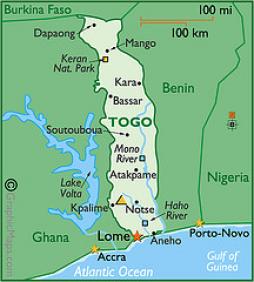The government of Togo has banned the use of SMS by the Rally of the Togolese People (RPT), the Togolese ruling political party, reports Highway Africa News Agency. The High Authority for Audiovisual Communications (HAAC), a press regulation body, has prohibited the messages because voters viewed the SMS as intimidation, calling them "unfair propaganda" and an "illicit practice."
According to the News Agency, voters had complained about unsolicited SMS messages received from the RPT in view of the upcoming legislative election on this Sunday, October 14. Supposedly, part of the message read, "To maintain the current dynamics of reconciliation and economic growth and social stability, vote RPT." The HAAC "has asked the country's political parties to follow the law or face the wrath of the law."
The Togolese voters may indeed be intimidated by the SMS, as the RPT has links to violent militias and a history of voter suppression. In an interview with MobileActive, Grant Godfrey, of the National Democratic Institute, said that the HAAC's ban of the SMS messaging showed an independence from the RPT-controlled government that boded well for peaceful, democratic elections. "The fact that they're actually doing anything that is antagonistic to the RPT is definitely leveling the playing field," he said. "It's actually kind of a gutsy decision for that government body."
While SMS is an increasingly popular tool by parties and candidates to get their message out. In Kenya's upcoming election, for example, new media are used extentively by all candidates to persuade voters. SMS is widely used. Yet, in a fragile democracy like Togo with a history of election violence, receiving an unsolicited SMS by the ruling party can also mean to a voter: We have your number and we are watching you.
Togo is a small sub-Saharan nation in West Africa. In 2005, the most recent election, violent protests led to government crackdowns, resulting in hundreds of deaths by security forces. Tens of thousands more people fled the country. Today, the country is trying hard to establish itself as a peaceful democracy. As the Mail & Guardian wrote, "Togo holds parliamentary elections on Sunday that, if free and fair, could convince international donors that the small West African state has fully embraced democratic rule." According to an analyst at Global Insight, "It was the undemocratic nature of Togo's politics that led to the cessation of relations with the donor community in 1993, but now ... a real opportunity to put Togo back on the right footing on the international stage has been created." The election will be closely monitored by international observers, with about 3,500 election monitors put in place for the election.
Although in the 2005 elections the Togolese government shut down television, radio, and mobile networks, Godfrey predicts that the current elections will run more smoothly and with more transparency as Togo wants to regain international aid. "I would be surprised if they did something like shut down the SMS networks on election day -- it would just be shooting themselves in the foot," Godfrey from NDI said.
Photo credit to Yodod.


Post new comment